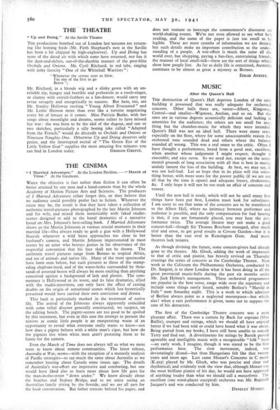MUSIC
After the Queen's Hall
THE destruction of Queen's Hall deprives London of the only building it possessed that was really adequate for orchestral concerts. Other halls there are, vaster—Albert, Kingsway, Central—and smaller—Wigmore, Aeolian, and so on. But the ones are in various degrees acoustically deficient and lacking in amenities for the audience; the others are too small for any- thing but the chamber-music for which they were intended. Queen's Hall was not an ideal hall. There were many seats, especially on the floor, where for some unaccountable reason the orchestral tone sounded dead and others where the balance sounded all wrong. This was a real snare to the critic. Often I have thought a performance, heard from a good seat, excellent, when another whose judgement I might respect, thought it execrable; and vice versa. So we need not, except on the senti- mental grounds of long association with all that is best in music, unduly lament the loss of the building. At best, we may say, it was not half-bad. Let us hope that in its place will rise some- thing better, with more seats for the poorer public (if we are not all that by the time it opens) and adequate foyers, cloakrooms, &c. I only hope it will not be too stark an affair of concrete and veneer.
Until the new hall is ready, which will not be until many first things have been put first, London must look for substitutes. I am sorry to see that some of the concerts are to be transferred to the Albert Hall, where no intimacy between performer and audience is possible, and the only compensation for bad hearing is that, if you are fortunately placed, you may hear the per- formance twice. The average theatre may not make a good concert-hall—though Sir Thomas Beecham managed, after much trial and error, to get good results at Covent Garden—but it is better than the vast oval in Kensington Gore. And many theatres lack tenants.
As though divining the future, some concert-givers had already gone to the theatre. Mr. Glock, adding the work of impresario to that of critic and pianist, has bravely revived on Thursday evenings the series of concerts at the Cambridge Theatre. Next week at the Coliseum the• Philharmonic Orchestra, conducted by Dr. Sargent, is to show London what it has been doing in all the great provincial music-halls during the past six months under Mr. Jack Hylton's management. These orchestral programmes are popular in the best sense, range wide over the repertory and include some things rarely heard, notably Berlioz's " Harold in Italy " next Saturday night. This is a work to which admirers of Berlioz always point as a neglected masterpiece—but which, alas! when a rare performance is given, turns out to support the case of his detractors.
The first of the Cambridge Theatre concerts was a most pleasant affair. There was a cantata by Bach for soprano (Miss Baillie), trumpet and strings, which we should all have enjoyed better if we had been told or could have heard what it was about. Being parted from my books, I have still been unable to consult Terry and find out. A divertimento for strings by Bartok proved agreeable and intelligible music with a recognisable " folk " basis —an early work, I imagine, though it was stated to be the first performance here. The slow movement, indeed, was devastatingly dismal—but then Hungarians felt like that twenty years and more ago. Last came Mozart's Concerto in C major (K.5o3) played by Mr. Glock, who was precise and clear and rhythmical; and evidently took the view that, although Mozart was the most brilliant pianist of his day, he would not have approved of anything louder than what we should call a mezzoforte. The excellent (one wind-player excepted) orchestra was Mr. Reginald Jacques's and was conducted by him.
DYNELEY HUSSEY.






























 Previous page
Previous page